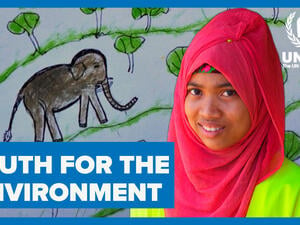Rohingya refugee volunteers trained to help others in distress
Rohingya refugee volunteers trained to help others in distress

Formin (right), a Rohingya refugee and community health worker, counsels 70-year-old Hanibi at the Kutupalong settlement in Bangladesh.
KUTUPALONG REFUGEE SETTLEMENT, Bangladesh – Seventy-year-old Hanibi says she finds it difficult to eat or sleep. The memory of two family members who were shot still haunts her and she worries about the coming monsoon season, when the bamboo houses of Kutupalong refugee settlement, where she and around 600,000 other people live, will be affected by the elements.
Formin, a volunteer counsellor, squeezes her hand.
“Don’t worry so much,” she reassures Hanibi. “You are safe here and need to stay strong. Your granddaughter relies on you. People are here to help you.”
Formin is confident and mature, despite just being 18 years old. She is one of several hundred Rohingya volunteers in settlements across Bangladesh who have received training on mental health issues, including basic psychological first aid, thanks to UNHCR (the UN Refugee Agency), Medical Teams International and Food for the Hungry.
"You are safe here and need to stay strong."
Community health workers like Formin visit refugees to assess gaps and needs. She recently took part in a three-day training organized by UNHCR’s mental health team.
“After the workshop I realized there are lots of people here who need some kind of mental health support,” says Formin. “People are still carrying strong memories of the violence they faced back in Myanmar. Many lost male family members and are having to cope on their own, and on top of that, people are worried about the monsoon, about daily survival.”
A lack of certainty about what the next few months will bring is distressing for many. Heavy rains over the hilly and overcrowded refugee settlements create growing fears among the refugee population about landslides, floods and cyclones. UNHCR, other agencies and partners are working hard to mitigate physical hazards in the overcrowded settlements by relocating those at highest risk of landslides and floods to safer areas, providing sturdier shelters and reinforcing slopes, paths, roads and bridges.
However, there are also concerns about the psychological impact that a disaster may have on an already vulnerable population, many of whom experienced or witnessed extreme violence in Myanmar.
“We are trying to reduce their tension."
UNHCR is working closely with Bangladesh authorities to combat this by training Rohingya refugees to become first responders to emergencies.
“Everyone is afraid of the natural disasters we might expect, says Mohammed Mostafa Kamal, 24, who is one of several Rohingya community outreach members being trained by UNHCR. “We don’t know if we will be able to save ourselves from disaster.”
“Different people are reacting in different ways,” says 22-year-old Ayub Khan, another trainee. He says he fled violence in his village in Myanmar, leaving behind two brothers who had been arrested. “People who have family members left behind like me are not in peace. They are not able to forget that. Concern about the monsoon is increasing our anxiety.”
UNHCR’s training for refugee volunteers focuses on practical ways to allay people’s worries, as well as how to identify those in particular distress who might need referrals to other health service providers and experts.
“My target is to teach them how to listen carefully to people and to help make them better prepared for this monsoon season,” says trainer and UNHCR mental health associate Mahmuda. “We are trying to reduce their tension because they have to be ready to cope with whatever comes, so that they can survive well.”
UNHCR has been scaling up its mental health and psycho-social support programme for the Rohingya response since late 2017.
“In settings such as mass displacement, where traditional community structures and support systems have broken down, it is important to look at how we can strengthen self-help within refugee communities,” says Mohamed Elshazly, a UNHCR mental health and psychosocial support officer. “It involves bringing to refugees together in a safe, contained environment, where they can share experiences, seek solutions and support each other.”
Back at Kutupalong refugee site, a fierce thunder and rainstorm calms as Formin finishes counselling Hanibi. “Thanks to Formin, I have some peace inside me,” says the relieved grandmother. “I feel good talking to her. We shared the same experiences, fleeing our villages. I feel close to her – its not like talking to an outsider.”
Volunteers like Formin are proud to be able to help others in the community, despite their own personal concerns. She says her training has given her the tools to be able to better relate and listen to the families she meets, identify problems and provide guidance.
“I know how I can console them, give advice and make them feel a bit better about the future,” she says.








